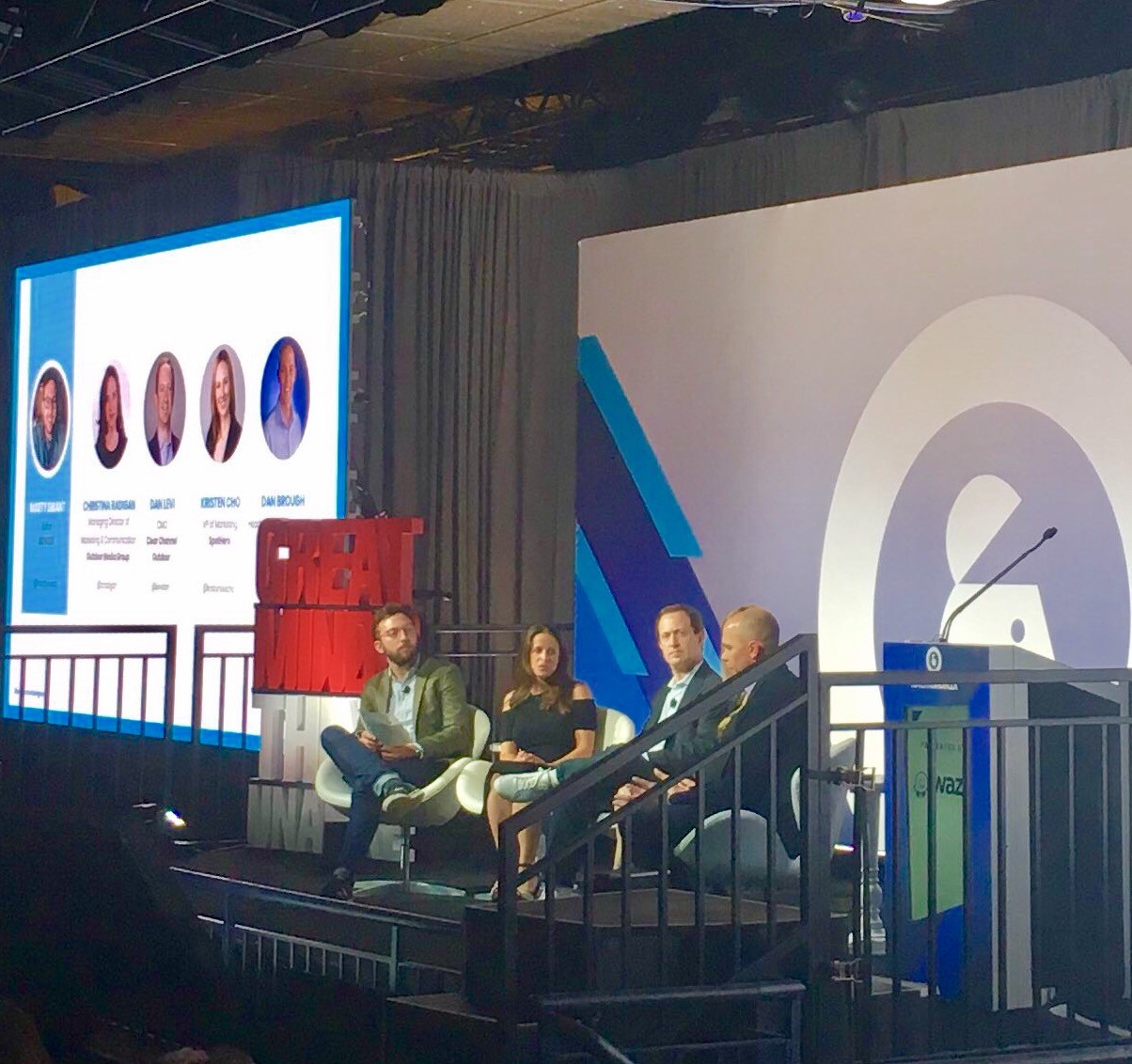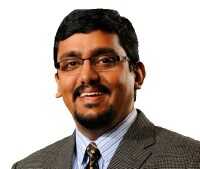Ad Week 2017 Takeaways and Projections from Senior Executives

Recalling the takeaways from dozens of sessions, panel discussions and demonstrations comprising Advertising Week in New York last week is no easy task. So, we asked senior media and marketing executives across various verticals for their observations and their prognostications -- about their own areas and for the industry overall. On the agency side, we heard from MEC, Starcom and Performics; Clear Channel Outdoor and National CineMedia weighed in from the OOH perspective; while leaders from IBM and NPR added their points of view from the tech and audio sides, respectively. Share your thoughts via social media -- and read theirs, below:
MediaVillage: What are the most compelling trend(s) you anticipate emerging in the coming year for your vertical?
Whitney Fishman Zember(right), Managing Partner, Innovation and Consumer Insights,MEC: “The evolution of voice and its role as a conduit for understanding genuine consumer behavior. We've seen what digital data has done for the marketing world in giving insight into who consumers are through screen-based behavior, but being able to hear one’s voice and their inflections that come with emotion and purpose will be an exciting space to watch the marketing world begin to play in.
understanding genuine consumer behavior. We've seen what digital data has done for the marketing world in giving insight into who consumers are through screen-based behavior, but being able to hear one’s voice and their inflections that come with emotion and purpose will be an exciting space to watch the marketing world begin to play in.
“On a more holistic, industry front, the changing role of agencies and their place at the brand table is a conversation that can't be ignored. This shift in position will have tremendous effects -- some of which can't even be assumed yet. As brands continue to take parts of the equation in-house like data measurement, and consultancies push their way into the partner space, agencies (media, digital and creative) will make bigger moves to stay relevant -- building on top of existing capabilities with services like production, content and technology in order to deliver truly one to one communications.”
Jordan Bitterman(right), CMO,IBM Watson Advertising: “Technology has been completely transforming industries for decades. A trend to watch moving forward is how technology is being used to address the challenges brought on by technology. It’s a bit meta when you think about it. The good parts of technology range from being able to order dinner from the back of a cab to buying media through automation. But, the next generation of tech will be put to work addressing the issues that technology has created for businesses: the need for speed, the huge cost of transformation, fragmented solutions and the security and ethics concerns that come with all major periods of change."
watch moving forward is how technology is being used to address the challenges brought on by technology. It’s a bit meta when you think about it. The good parts of technology range from being able to order dinner from the back of a cab to buying media through automation. But, the next generation of tech will be put to work addressing the issues that technology has created for businesses: the need for speed, the huge cost of transformation, fragmented solutions and the security and ethics concerns that come with all major periods of change."
Dan Levi(pictured at top, second from right), Executive Vice President, Chief Marketing Officer,Clear Channel Outdoor: “Mobile location data will continue to provide a deeper understanding of consumer mobility and behavior in the physical world, dramatically changing the way marketers think about out-of-home advertising and its value in the broader, mobile-driven media mix.”
Cliff Marks(right), President,National CineMedia (NCM): “The most compelling trend to watch in the cinema media industry will be the evolution of cinema sales companies from primarily selling on-screen ads to becoming more immersive digital media organizations, such as we’re doing with the Fantasy Movie League and Noovie. They are part of a new digital products ecosystem that will enhance engagement and brand interactivity, such as bringing AR and VR to the lobbies and the big screens.”
cinema sales companies from primarily selling on-screen ads to becoming more immersive digital media organizations, such as we’re doing with the Fantasy Movie League and Noovie. They are part of a new digital products ecosystem that will enhance engagement and brand interactivity, such as bringing AR and VR to the lobbies and the big screens.”
Dr. Ramendra (Ram) Singh, Senior Vice President, Analytics and Technology,Performics: “Brands still have major challenges extracting insights from data to drive business outcomes. Only 39% of organizations are capturing the business benefits of customer data, and only 4% are in the “information elite.” Luckily, the most compelling trend in the coming year will be the effort that brands are finally taking to eliminate overarching organization barriers -- like priority, funding, talent and silos -- that are holding back the potential of data.”
Bohb Blair(right), Global Chief Experience Officer,Starcom: “The death of ads and aisles. In a post-interruptive advertising world where people are willing to pay for the content and services they value, we’re losing traditional ways of inserting brands into consumers’ lives. I live it personally. My Netflix, HBOGo and Hulu queues promise weeks of binge watching. A subscription to Spotify and The New York Times keeps my ears and mind full. My family gets three meals a week from Plated, and Amazon Prime handles most of our shopping. This world has no ads or aisles.
willing to pay for the content and services they value, we’re losing traditional ways of inserting brands into consumers’ lives. I live it personally. My Netflix, HBOGo and Hulu queues promise weeks of binge watching. A subscription to Spotify and The New York Times keeps my ears and mind full. My family gets three meals a week from Plated, and Amazon Prime handles most of our shopping. This world has no ads or aisles.
“In our desire for personalized, instantaneous access to content and services, we’re not looking to pause for brands. Marketers must create brand experiences people seek out. We have to create branded content that competes for attention with editorial. Now, more than ever, we must earn the attention we can’t buy.”
Gina Garrubbo(right), CEO, National Public Media, NPR’s sponsorship subsidiary: “Voice-activated smart speakers are changing consumer behavior when it comes to audio. According to our new Smart Audio Report with Edison Research, 70% of smart speaker owners are listening to more audio since getting the device and 65% say they ‘wouldn’t want to go back to a life without one.”
NPR’s sponsorship subsidiary: “Voice-activated smart speakers are changing consumer behavior when it comes to audio. According to our new Smart Audio Report with Edison Research, 70% of smart speaker owners are listening to more audio since getting the device and 65% say they ‘wouldn’t want to go back to a life without one.”
Bryan Moffett(right), COO, National Public Media, NPR’s sponsorship subsidiary: “With the debut of Apple Analytics and other efforts in the industry, there should be significant progress in moving podcast metrics from downloads to actual listens.”
NPR’s sponsorship subsidiary: “With the debut of Apple Analytics and other efforts in the industry, there should be significant progress in moving podcast metrics from downloads to actual listens.”
MV: What trend or takeaway from Advertising Week intrigued you most?
Whitney Fishman Zember, MEC: “Despite what many fear, AI is a friend, not a foe, to marketing jobs. It was suggested a few times, across different panels, that the current capabilities of AI in fact allow for an alleviation of tedious work so that humans can focus more on insights and creativity, allowing brands to better align with the platform, screen and content to achieve the intended outcome. That EQ and human quotient can’t be replicated by AI.”
Dr. Ram Singh(right), Performics: “We’re all drowning in data! But the answer isn’t more tech, more analysis or more data sources. To empower this data to drive business outcomes we must undertake a “systems approach,” which breaks down the gap by data elements, tech and advanced data science, and ties these gaps back to a business outcome, like lowering CPA and CPM, or increasing conversion.”
Jordan Bitterman, IBM Watson Advertising: "You might think I would say this as part of the team that launched Watson Advertising during Advertising Week, but: I truly do think that Artificial Intelligence has arrived. It has been a buzzword for a long time, but here are the really tangible opportunities we have if we put it to use. First, we can make data useful. So much of the world’s data isn’t usable; in fact, only 20% is even discoverable by search engines. AI can help us put it all to use including that information in insights hidden in video and images. Second, we can connect the unconnected, meaning we can connect the data we have in marketing to other aspects of business including sales and logistics. Data is ubiquitous, but we put it in silos and AI can help us undo that. Third, we can optimize decisions. AI can help us take the risk out of decisions to save us time and money."
Dan Levi, Clear Channel Outdoor: “The rapid pace of progress in applying data insights and programmatic technology to traditionally off-line, linear mediums like TV, radio and out of home. And the accelerating evolution of the traditional linear TV ad model in reaction to changing viewing behavior of a rapidly growing percentage of the U.S. population.”
Cliff Marks, NCM: “We continue to be excited about tech like AR, VR and 3D as consumers are highly engaged and the technology enhances their entertainment experience. Media companies will reap great first-party data as consumers love this tech and will engage for longer providing great data opportunities.”
Dr. Ram Singh, Performics: “We’re all drowning in data! But the answer isn’t more tech, more analysis or more data sources. To empower this data to drive business outcomes we must undertake a “systems approach,” which breaks down the gap by data elements, tech and advanced data science, and ties these gaps back to a business outcome, like lowering CPA and CPM, or increasing conversion.”
Gina Garrubbo, CEO, National Public Media, NPR’s sponsorship subsidiary: “Voice assistance will be touching all parts of people’s lives, fueling significant changes in consumer behavior and purchasing patterns. We’re already starting to see this in the smart speaker category with more than half of smart speaker owners already making purchases using these devices.”
MV: What concerns you most about the ad industry today, or looking ahead to 2018?
Whitney Fishman Zember, MEC: “That marketers are experiencing a bit of ‘buzzword bingo’ fatigue and are too quick to dismiss ‘trends’ before taking the time to really understand what the idea is, and what opportunities lie within it.”
Dan Levi, Clear Channel Outdoor: “That the interests of ad agencies and their service and compensation models are still not consistently aligned with the interests of their clients. Unless agencies reinvent themselves and the way they work with and bring value to clients, I fear their important role in the advertising and marketing ecosystem will continue to diminish.”
Dr. Ram Singh, Performics: “Many of the major trends you hear about -- people-based marketing, content personalization, end-to-end optimization, dynamic pricing, cross-channel automation, etc. -- cannot fully come to life until we fix the data foundation that will power all of this.”
Cliff Marks, NCM: “In general, I’m very optimistic about the future of the industry but I do worry about the trend towards consuming content via OTT and other non-commercial video outlets. While video content has never been better, it is also true that brands will struggle more to utilize premium video, as consumers commercial viewing habits are changing as a result of how they watch online video like YouTube and Facebook as well as their propensity to watch content on non-commercialized OTT outlets.”
Click the social buttons above or below to share this content with your friends and colleagues.
The opinions and points of view expressed in this content are exclusively the views of the author and/or subject(s) and do not necessarily represent the views of MediaVillage.com/MyersBizNet, Inc. management or associated writers.


